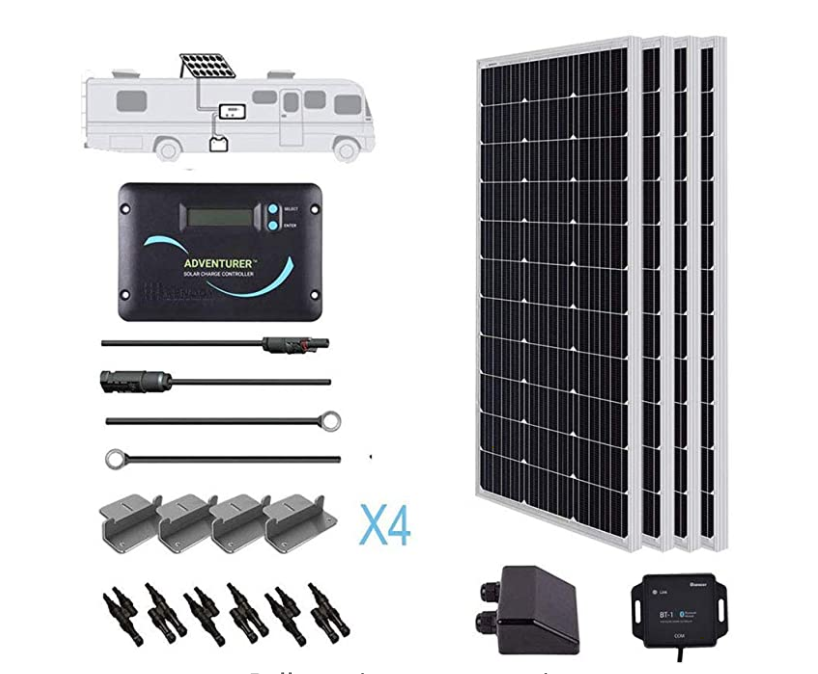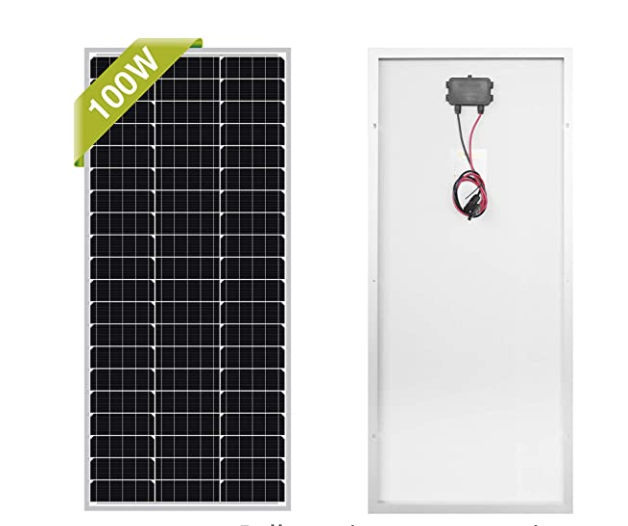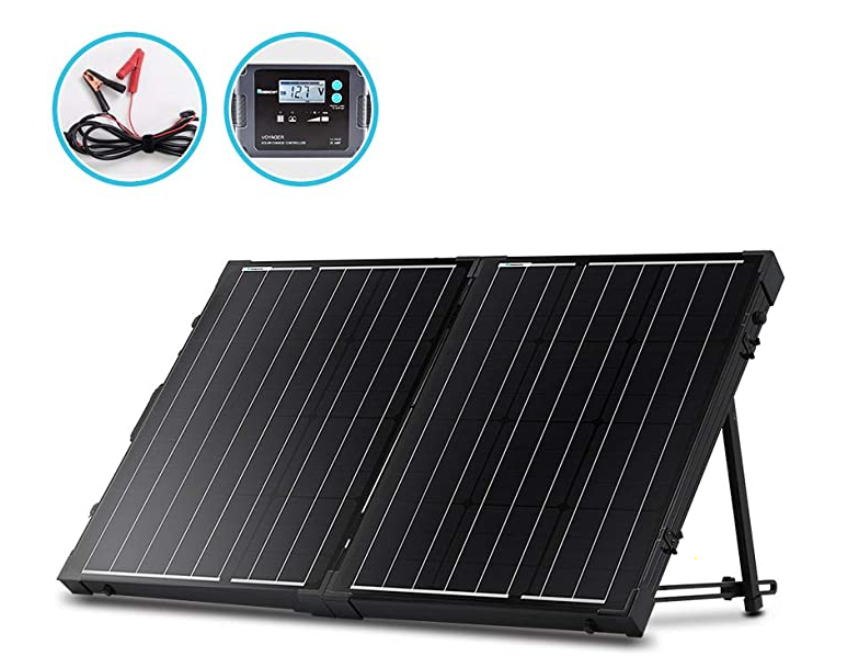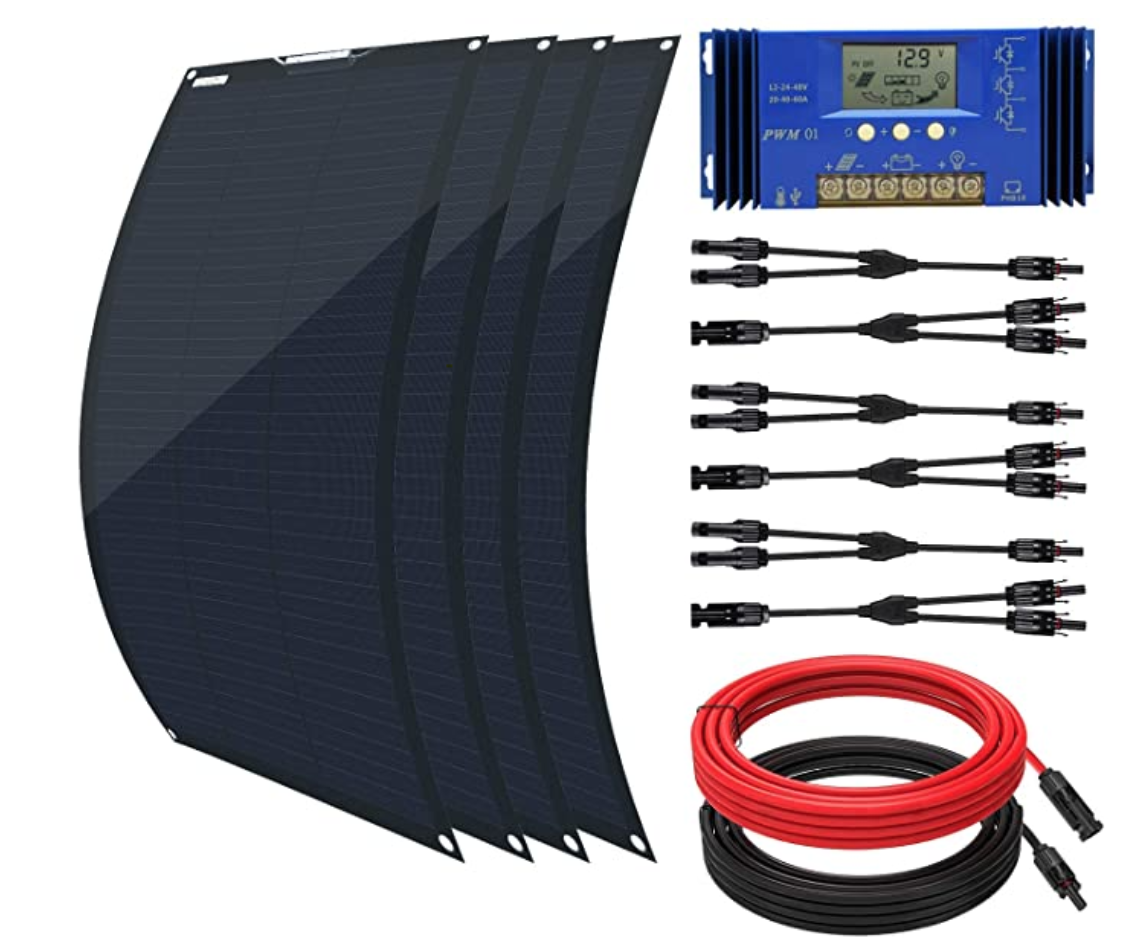There is nothing better than hitting the road in your RV. Thanks to modern technology, turning your RV into a functional home is easier than ever, especially when it comes to electricity. Gone are the days of having to rely on campsite hookups and gas generators, nowadays modern RVers are going off the grid with free renewable solar power.
Using solar energy to power your RV or camper has become so popular that many solar companies are now producing solar panel kits specifically for RV use. Whether you’re looking for a large set up for your full-time RV or just a small solar back up for occasional dry camping, there is a solar system for you. To help make your transition to solar a little easier, we’ve done some research and compiled a list of some of the best RV solar panels on the market. Go ahead and take a look at our picks and then keep reading for a little extra information about how to choose the right solar panels for your RV or camper.
Top 4 Best RV Solar Panels of 2021
- Renogy 400W RV Solar Panel Kit: Best Overall RV Solar Panels
- Newpowa 100W Solar Panel: Best Budget RV Solar Panel
- Renogy 100W Portable Solar Panel: Best Portable RV Solar Panel
- ECO-WORTHY 400W Flexible Solar Panel Kit: Best Flexible Solar Panel Kit
Reviews of the Best RV Solar Panels
Renogy 400W RV Solar Panel Kit
Quick Look: 400W solar power system for RV use. Comes with four 100W monocrystalline solar panels, 30A PWM charge controller, cable entry housing, all necessary cables, and mounting brackets. Check Price at AmazonIf you have been researching solar panels for any amount of time then you’re probably familiar with the name Renogy. Renogy is one of the most popular names in solar power, especially when it comes to RV panels. Their panels are lightweight and heavy-duty, the perfect choice for off-grid travelers.
This kit is specifically designed for RV installation. It comes with all the wiring and mounting brackets you need for full installation. It even comes with an ABS plastic cable entry housing designed to seal the area around where the cables enter your RV. This will prevent leaks and corrosion around the area.
The included 30A charge controller was also created with RVs in mind. This PWM controller comes with an easy-to-read digital display to help you monitor your batteries with ease. It has a sleek flush mounting design and is compatible with Renogy’s Bluetooth module, so you can monitor even your charge parameters from your phone.
Learn More and Buy Now at AmazonNewpowa 100W Solar Panel
Quick Look: 100W monocrystalline solar panel. High-efficiency and lightweight. Comes with preinstalled wiring and junction box. Includes a 25-year transferable power output warranty. Check Price at AmazonDo not let a small budget stop you from going solar! Even if your budget is tight, there are still good options like this quality solar panel from Newpowa. This panel is sold individually or in sets, so you can purchase them as your budget allows.
Weighing in at only 16.3lb, these panels are lightweight but still built to last. They are water and weather-resistant and come with heavy-duty anodized aluminum frames. The monocrystalline wafers are protected by low-iron tempered glass designed to be fully transparent and durable.
These panels also offer easy installation. Each unit comes with a junction box and 3’ of pre-attached MC4 solar cable. These panels are a great choice for charging solar generators or for use in a full solar system.
Learn More and Buy Now at AmazonRenogy 100W Portable Solar Panel
Quick Look: 100W foldable monocrystalline solar panel. Comes with durable carrying case, waterproof 20A PWM charge controller, and easy-connect cables with alligator clamps. Compatible with multiple battery types. Check Price at AmazonLooking for a way to go solar, but aren’t quite ready to install a full solar system? Then you should try this portable solar panel from Renogy. This panel is lightweight and compact, making it easy to take along on all your camping adventures.
The panel itself is made of two 50W high-efficiency monocrystalline panels which are attached to a heavy-duty frame. The frame functions as the perfect stand, keeping your panel tilted toward the sun for maximum sun exposure. This unit is waterproof and weather-resistant, so you won’t have to worry about leaving it out for days at a time.
This panel also comes with a built-in waterproof 20A charge controller. The controller comes with a backlit LCD screen for easy charge monitoring. It also has vibrant LED lights to clearly indicate your battery’s level of charge. Speaking of batteries, this unit is compatible with seven different types including gel, sealed, and lithium batteries.
Learn More and Buy Now at AmazonECO-WORTHY 400W Flexible Solar Panel Kit
Quick Look: 400W solar power system. Comes with four ultra-lightweight 100W flexible solar panels, 60A PWM charge controller, and all necessary wiring. Check Price at AmazonNot all RVs are created equal. Some have large flat roofs that are perfect for traditional solar panels and some do not. If your RV is one of the models that doesn’t have a perfectly flat roof, do not despair, you can still take advantage of solar power with these ultra-lightweight flexible panels from ECO-Worthy.
These panels weigh only 3.9lb each and can flex up to 30 degrees, perfect for uneven rooftops. These panels can be attached to your RV using the heavy-duty grommets on the corners of each panel or that can be glued directly to the roof. These panels are water and weather-resistant and have a non-stick surface, so they require very little maintenance.
The included charge controller is powerful enough to handle 60A and is compatible with sealed, gel, lithium, and flooded batteries. The controller comes with an easy to read LCD screen that will clearly show you everything you need to know about the state of your batteries including charge level, temperature, load current, and more.
Learn More and Buy Now at AmazonHow We Chose The Best RV Solar Panels
With so many companies creating RV solar panels, choosing the best ones can be a challenge. To narrow our search we chose to focus on a few key features including durability, efficiency, and ease of use.
Durability
For many people, the biggest investment that they have to make when customizing their RV is the solar system. Installing solar panels always pays off in the end, but the initial investment can be a bit daunting. With that in mind, we focused on finding high-quality panels that were built to withstand the rigors of traveling in all climates. All of our picks are waterproof, weather-resistant, corrosion-resistant, and even capable of withstanding the weight of snow loads. We know that this is a big investment that you only want to make once, so long-lasting durable materials are a must.
Efficiency
One issue that many RVers experience when installing solar panels is a lack of space. Unlike the roof of a house where there is usually plenty of room for multiple panels, RV roofs are a bit limited. That is why we chose high-efficiency panels. High-efficiency panels generate more energy while taking up less space. We also looked for lightweight options because no one wants a bunch of extra weight on their rig. All of these panels are powerful enough to keep your batteries charged, but light enough to not drain your fuel tank.
Ease of Use
We know that installing a solar kit for the first time can be intimidating, but we don’t want new solar enthusiasts to be intimidated or dissuaded from choosing solar. That is why we looked for solar panels and solar kits that offer straightforward and simple installation. We chose a variety of kits and singular panels to show that there is something for everyone. Each of these kits would work just as well for a beginner as they would for a pro.
What You Need To Know About RV Solar Panels
Home solar kits and RV solar kits have a lot in common. In fact, all of the solar panels and kits on this list would work for home use just as well as they would in your RV or camper. That being said, there are a couple of extra things that you should consider when choosing RV solar panels as opposed to choosing a home-use kit.
Solid Vs. Flexible
This is probably one of the most talked-about debates when it comes to RV solar panels: solid versus flexible. Solid panels, or traditional solar panels, are rigid and significantly heavier than their flexible counterparts. The benefit of solid panels is that they are almost always more efficient than flexible panels, producing more wattage per square foot. There are a few new brands of flexible panels that are equally efficient, but they are also quite a bit more expensive. Another benefit of solid panels is that they are designed to last upwards of 30 years, where most flexible panels have a lifespan of approximately 10 to 15 years.
On the other hand, flexible panels are much easier to install since they can be glued on instead of having to bolt them to the roof. Since solid panels have to be bolted down, there is always a risk of leaks and water damage if the bolt holes are not properly sealed. Flexible panels help users avoid that risk. Flexible panels also have the benefit of being, well, flexible! They’re perfect for rounded or unusual rooftops.
To Lift Or Not To Lift
Another big question that comes up a lot with RV solar systems is whether or not you should tilt your panels. The answer depends on a number of factors such as when and where you will be traveling. Since the angle of the sun varies throughout the year, being able to tilt your panels can make a big difference in the amount of power your system is able to generate. For example, if you’re traveling during the winter months, when the sun is at a lower angle, tilting the panels can increase power output by 40% to 50%. This is especially true if you’re traveling in the northern hemisphere. On the other hand, if you plan on traveling mostly in the summer, you will have little to no reason to tilt your panels. Because the sun is at its highest in the summer, flat panels will work just fine.
A solar system with tilting panels will be more expensive because you have to purchase adjustable mounting frames. The cost of the frames depends on the design and features, such as whether you want to manually adjust them or if you prefer automatic adjusting. If you plan on RVing year-around, then it would definitely be worth the investment, but if you’re just going out for the summer, you can probably skip it.
How to Choose The Best RV Solar Panels For You
Now that you know your options, let’s talk about the two main things you need to consider when purchasing your RV solar panels.
Power
You’ve probably already guessed this, but the first thing you need to consider is power. Not just the amount of power you plan on using, but how you plan on using it. For example, will you be frequenting campgrounds with electrical hookups or do you plan on doing mostly off the grid camping? If your solar system is just a backup for occasional use, then you may not want to invest in a large system. If boondocking is more your style, then you will want to carefully consider the amount of power you need and design your system to match.
A good place to start is to determine the amount of power you use on an average day of camping. This can be done by taking a battery monitor along with you on your next camping trip. Monitor your electricity usage over a few days so that you can determine the average amount of power you will need each day. You may even have to take a couple of camping trips to collect extra data.
This is a process that will take time and research, but it will be well worth the effort. Just remember, if you plan on relying exclusively on solar power you should design your system to be slightly bigger than what you think you may need. When you’re camping in the wilderness it is far better to have a little extra power than not enough.
Style
Choosing the style of solar panels you need is fairly straightforward. Your three main options are solid, flexible, and portable. Each option has its pros and cons, but in general, these are the main situations where you would want to choose one over the others.
Solid Panels
Solid panels are the most durable, the most efficient, and the most cost-effective if you need a large, permanent solar system. This is the best choice for year-around RVers.
Flexible Panels
Flexible panels are significantly lighter and easier to install than solid panels but aren’t quite as efficient. These are a good choice for those who have a rounded rooftop or other non-traditional mounting options or for those who are concerned about drilling into the roof of their RV.
Portable Panels
Portable panels are as efficient as solid panels but aren’t usually designed to be hooked together for large solar arrays. These panels are a good choice for those who do not want to install a large solar system, but still want to take advantage of free solar energy.
Bottom Line
RVing offers plenty of freedom, fun, and adventure. Wondering if you’re going to have enough electricity should never be part of that adventure. With the right solar panels and solar system, you can do all the boondocking you want without ever having to worry about if you’ll be able to charge your phone and have the lights on at the same time. Though you can’t go wrong with any of our top picks, we recommend Renogy 400W RV Solar Panel Kit.
Top 4 Best RV Solar Panels of 2021
- Renogy 400W RV Solar Panel Kit: Best Overall RV Solar Panels
- Newpowa 100W Solar Panel: Best Budget RV Solar Panel
- Renogy 100W Portable Solar Panel: Best Portable RV Solar Panel
- ECO-WORTHY 400W Flexible Solar Panel Kit: Best Flexible Solar Panel Kit



